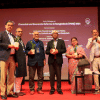University: Our factory of miseducation

In his book Excellent Sheep, referring to today's university students in the title, William Deresiewicz writes about university education abroad, "We have constructed an educational system that produces 'intelligent' individuals who have no idea what they want to do with their lives: no sense of purpose and, what is worse, no understanding of how to go about finding one." Can we claim to have done anything different? What is the purpose of our universities? To get jobs, right? Indeed, each of us who pass through university in Bangladesh is merely an employee at work, a consumer in the market, and a submissive citizen of the state. But university is meant to be different from school, than college, and should be more than about being equipped with skills. It should be about creating the next generation of thinkers, right? Even in terms of skills, haven't we been failing largely?
Indeed, our universities are factories – often factories of miseducation. So, what do we do about it? Today, I present a list of what I wish we could do.
One, effectively eradicate the toxic forms of student and teacher politics in our universities, and bring back good politics. Politics, in its truest sense, is meant to be a means of mobilising voices and democratising processes. Choosing a student representative, protesting for someone's rights, electing teachers to represent the university in policy spaces – these are political practices, too. This is far from the meaning of the word in our universities today, and frankly, it has long gone too far.
Two, rethink the definition of merit and break, once and for all, the persisting "bad student" fallacy that our university meritocracies thrive on today. Breaking this fallacy means realising that a good CGPA may mean a good student, but a bad CGPA does not necessarily mean a bad student. Why? Because we haven't yet ascertained an assessment system where we can completely reliably determine this. If someone loses their interest and classes actually kill their curiosity, they tend to not give their best. We don't think twice before filtering our students into "good" or "bad," but we forget that in a system where memorisation and rote-learning remain prevalent, in most cases, academic results largely depend on how students' merit is being assessed in the first place.
This is where the patterns of exam questions play an important role – we still have exams at the university level that do not require students to think and critically reflect on what they learn. Often, it is highly questionable whether the grades and CGPAs we use to measure student achievement reflect actual intelligence, but then again, what do we mean by intelligence in the first place? If it means being able to think critically, be creative and original, then I myself have seen many students with "bad" CGPAs show an indication of these qualities. How we assess our students says a lot about what we expect of them: do we want them to learn to think or do we want them to be able to write down, like totapakhis as Rabindranath said, what others have thought? Do we want to groom our next Rabindranaths or just tertiary-educated individuals who can recite, flawlessly, a Rabindranath classic from memory? Even the admission test questions for getting into university need to be revised in terms of what we want from our incoming students.
If it were up to me, I would want to know why they want to go to university in the first place, their stories, and whether they have passion. These are aspects one has to think about when applying to universities abroad, but for us, our admission criteria remain at the stage of testing how much our students know by making them answer a bunch of MCQs, often requiring information that nothing but memorisation can yield. Yes, how we assess quality matters.
Three, initiate the much needed focus on students' well-being and mental health. Stop presenting results publicly on results boards. University education should not be a rat race or just a competition. Students should be able to focus on improving their own learning without their failures being displayed for everyone to see.
Four, and very importantly, promote the learning of humanities and liberal arts even when someone is studying STEM. Subjects like philosophy, history and literature are essential to a university student – to anyone, really – understanding their identity, their culture, who they are, and where they came from. These subjects are what teach students how to think and not just what to think, and we need to make these disciplines essential to any university education.
Five, make teaching, and not research, the main goal for university faculties. Better yet, separate teaching positions from teaching and research positions. It is because we measure the success of a teacher by the research they are doing, instead of whether they're fulfilling their teaching duties properly, that our students are very often not learning anything inside our classrooms, simply because they are not being taught. Teaching properly and teaching well takes time; we have to give time and effort to planning our lessons for our audience, we have to pay attention to the wonderful variety in the students listening to us. It takes time to truly care. It takes time to focus on not only teaching, but teaching that translates into actual learning.
Six, reform the university admission "quota" system. No, we don't need quotas in place for children of university faculty – I've seen this do more harm than good. We need quotas for students entering university from socioeconomically struggling backgrounds. We need classrooms filled with a variety of students – the son of a rich businessman as well as the daughter of a farmer, a conformist as well as a rebel. We need quotas to balance access to universities and we need diversity for our universities to be places of debate and conversation, creativity and original thinking.
Finally, where needed, we need to improve the living conditions in our university halls and cafeterias, because no student should have to endure in an environment that is not meant for learning or living. To do this, we need to streamline power and free the administration from the grips of politics; it's more than just a matter of money. If student leaders – often those who fail their courses year after year – illegally hold onto student seats in halls, then investing in better student halls won't make much of a difference. It becomes, above everything, important to build strong institutions within our universities and, if we really want to make a difference, we need to begin by calling a spade a spade.
Rubaiya Murshed is a PhD researcher at the Faculty of Education, University of Cambridge. She is also a lecturer (on study leave) at the Department of Economics, University of Dhaka.
Views expressed in this article are the author's own.
Follow The Daily Star Opinion on Facebook for the latest opinions, commentaries and analyses by experts and professionals. To contribute your article or letter to The Daily Star Opinion, see our guidelines for submission.

 For all latest news, follow The Daily Star's Google News channel.
For all latest news, follow The Daily Star's Google News channel. 











Comments